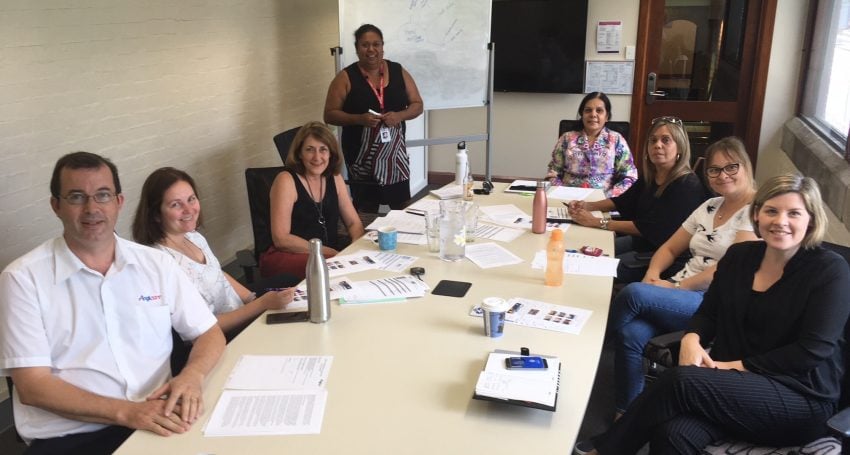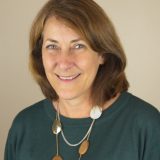Anglicare’s Reconciling Histories project
Reflections
As part of our series of stories on RAP implementation, Leanne Wood and Olivene Yasso share about Anglicare Southern Queensland’s Reconciling Histories project, including how it was born and what stories the project is documenting

Story Timeline
Reconciliation Action Plan achievements
- Pilgrimage to Wontulp-Bi-Buya (WBB) College
- St Mark’s supporting First Nations constitutional reform
- New Anglicare SQ cards further Reconciliation journey
- SEQ Friends of Nungalinya College – building cultural bridges
- Reconciliation: relationships and respect
- Reconciliation Prayer Spaces
- Exploring mission in a post-colonial Australian church
- First Nations ‘icons’ – a portal to Aboriginal and Torres Strait Islander Spiritualities
- Ancient Aboriginal practice meets Divine Christian call
- Stunning Aboriginal dot paintings to travel around our Diocese
- PATSIMAC group creating welcome and honouring the culture of the Yugambeh people
In recent years, Anglicare has very intentionally sought to strengthen our connections with Aboriginal and Torres Strait Islander peoples in our communities, to deepen our understanding of culture, and to explore the ways we can walk our Reconciliation journey together.
Our Diocesan Innovate RAP has given us a framework of relationships, respect and opportunity to guide our travels; and, we have many stories to share.
But up until now, many of these stories have risked becoming lost from sight, swallowed up in the everyday rush and bustle of getting on with life and work.
We’ve had no place to document and celebrate the events we have shared; acknowledge the challenges and successes of our projects and programs; or, recognise our First Nations staff and clients.
So the Reconciling Histories project was born, in an attempt to capture some of our Reconciliation journey and the history we have shared so far.
With the support of Anglicare’s Executive Team, a volunteer working group of both Aboriginal and Torres Strait Islander and non-Indigenous staff was established to champion and drive the project into the future.
The working group is chaired by Anglicare’s Cultural Capability Facilitator (Indigenous), Olivene Yasso.
“We need to celebrate our achievements and talk about our challenges, not only with our organisation but with the community,” Ms Yasso said.
“This is how we learn, grow and build our relationships, through sharing our stories.”
Working group members represent a range of Anglicare branches and services across Brisbane, the Gold Coast and the Sunshine Coast, including Foster & Kinship Care; Organisational Development; Marketing; Community Aged Care & Disability; and, Research and Advocacy.
Advertisement
Through our working group, and their networks and relationships with other staff, we’re gradually weaving a tapestry of stories about our Reconciliation journey.
From Gympie, we heard that a group of foster carers and children had attended a Bangarra Dance Theatre production of Dark Emu, providing an important opportunity to demonstrate to the young people that their culture, identity and history are vigorous and celebrated.
As our Gympie and Sunshine Coast Cultural Supporter Worker, Marnie Weule, pointed out: “It was an opportunity for everyone to witness the beauty of our First Nations culture.”
On the Gold Coast, a staff member, Belinda Simon, has offered to write the story of our RAP journey in her traditional language. Together with a message stick being made and decorated by fellow cultural support worker, Noel Doyle, the story will travel from Anglicare office to office across Southern Queensland, acting as a focus point for yarning, listening and learning.
In Brisbane’s corporate services area, an Acknowledgement of Country card was developed for our leadership team to support them in offering an Acknowledgement at the commencement of meetings or other events.
Advertisement
Our hope is that as people become accustomed to offering the Acknowledgement and learn more about the local area that they service, they will gradually feel less need of a script, and more able to spontaneously offer an Acknowledgement from the heart.
More stories of Reconciliation are being gradually and respectfully gathered in conversations with individuals or through yarning circles, and by research into archives and online sources.
Reconciling Histories is an ongoing project. We hope that over time our account of Anglicare’s Reconciliation journey will grow in depth, creating a shared history that reflects the richness of our First Nations’ cultures, histories and achievements.
As Cameron Webster, one of our Reconciling Histories working group members, has said: “There is no alternative to Reconciliation. We must forge a new path for all Australians.”
Please visit our website for more Reconciling Histories stories.






